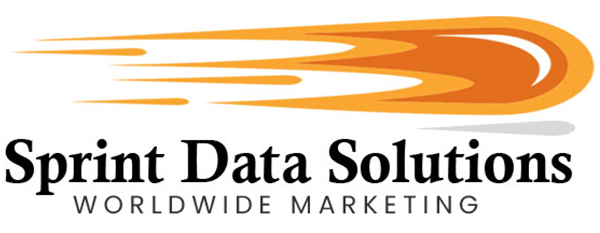Get Bigger, Better Marketing Returns On Your Investment
Sprint Data Solutions Worldwide Marketing is a comprehensive, full-service business proudly owned and operated by a disabled veteran. Our mission is straightforward yet powerful: to equip clients with precise, actionable leads that drive significant results—whether it’s increasing sales, boosting donations, generating voter interest, or achieving any other goal tied to mass market outreach.
In today’s rapidly evolving marketing landscape, businesses, charities, and political organizations face the challenge of reaching a diverse audience effectively. Gone are the days when merely casting a wide net was sufficient. The modern paradigm shifts the focus from the sheer volume of potential leads to the quality and relevance of those leads.
At Sprint Data Solutions, we understand that to successfully engage people—whether it’s to persuade them to purchase a product, utilize a service, subscribe to a cause, donate, or participate in an election—you need to connect meaningfully with your target audience. This requires a strategic approach that combines cutting-edge digital marketing techniques with in-depth analytics, allowing us to identify and curate high-quality leads tailored to your specific objectives.
By leveraging our extensive database and advanced targeting capabilities, we ensure that our clients can reach the right people at the right time, maximizing the impact of their outreach efforts. We pride ourselves on our commitment to excellence and integrity, providing our clients not just with data, but with insights that foster engagement and drive results.

The Broadest Spectrum
The nature of business has changed a lot in the 21st In the past century, particularly during the 20th century, success in the general consumer market hinged on a rather simplistic approach: reaching out to the broadest audience possible by appealing to the lowest common denominator. This strategy was rooted in the understanding that to sell effectively, one must generate widespread awareness of a product or service. Consequently, marketing efforts primarily focused on expansive advertising campaigns aimed at saturating the market with messages.
This approach was not without its limitations. With the technology and resources available at the time, businesses relied heavily on mass advertising channels—television, radio, print, and outdoor billboards—to disseminate their messages. The philosophy was clear: by exposing as many people as possible to a marketing technique, businesses hoped to harness the law of averages. The idea was that if enough individuals encountered the advertising, a portion of them would inevitably respond favorably to the product or service being promoted.
While this model may have generated some level of success, it often resulted in wasted resources and missed opportunities. The indiscriminate nature of such broad marketing efforts meant that many potential customers were either disengaged or uninterested, leading to a diluted impact. Additionally, the lack of targeting made it challenging for businesses to connect with the specific needs and preferences of diverse consumer segments.
As we transitioned into the digital age, the marketing landscape evolved dramatically. Advances in technology and data analytics have paved the way for a more refined and targeted approach. Today’s marketers no longer need to rely solely on sheer volume; they can now focus on engaging consumers in a more personalized manner, leveraging insights to tailor messages that resonate with individual preferences. This shift represents a fundamental change in how businesses approach consumer engagement, emphasizing the importance of quality over quantity in marketing strategies.
The marketing landscape of the analog era was characterized by a rather rudimentary approach, where strategies like billboards, television, and radio commercials served as the primary means of reaching consumers. These methods were broadly generalized, lacking the nuance and targeting capabilities that modern marketers enjoy. Businesses deployed these tactics based on research indicating high foot traffic or viewership at certain times and locations, hoping to cast a wide net and attract attention.
However, this broad approach came with significant drawbacks. One of the most pressing issues was the inability to accurately measure the precision and effectiveness of these marketing techniques. Unlike today’s digital landscape, where analytics can track engagement and conversion rates in real-time, the analog era relied heavily on anecdotal evidence and generalized feedback. Marketers had few reliable ways to gauge the impact of their campaigns, leaving them with little more than educated guesses about their success.
Direct mail represented one of the few exceptions to this rule, offering businesses some level of analytical feedback. By including order forms or surveys with their mailings, companies could gain insights into consumer behavior and preferences. For instance, they might ask recipients whether a specific piece of marketing had motivated them to make a purchase or take some form of action. While this provided a glimpse into consumer responses, it still fell short of offering a comprehensive view of campaign effectiveness.
The challenge of obtaining precise data on lead generation and sales was exacerbated by the sheer variety of variables at play. Market conditions, consumer moods, and competing messages all influenced how individuals responded to marketing efforts, making it nearly impossible to isolate the impact of any single campaign. Consequently, businesses often relied on statistical analyses to develop estimates based on available data, but these were typically imprecise and subject to interpretation.
As a result, the best that marketers could hope for was a rough understanding of their efforts’ effectiveness. This uncertainty hindered strategic planning and made it difficult for businesses to optimize their marketing investments. The lack of hard data left many companies navigating in the dark, struggling to refine their approaches and maximize their return on investment. This landscape set the stage for the eventual transition to digital marketing, where data-driven strategies would revolutionize the way businesses engage with their audiences and measure the success of their campaigns.
Digital Changes The Game
The most significant transformation brought about by the advent and widespread adoption of digital technology lies in the enhanced accessibility and analyzability of data. Unlike the analog era, where information was often scarce and difficult to quantify, the digital medium inherently operates through data—everything from user interactions to system responses is rendered as trackable data points. This shift has fundamentally altered how businesses engage with consumers and assess the effectiveness of their marketing strategies.
In a digital environment, every action a user takes—be it clicking a link, watching a video, or making a purchase—generates data that can be meticulously tracked and logged. This wealth of information allows marketers to gain deep insights into consumer behavior, preferences, and trends. With the right tools and analytics platforms, businesses can now monitor user engagement in real-time, enabling them to make data-driven decisions that enhance their marketing efforts.
Moreover, the ability to segment and analyze this data means that businesses can tailor their approaches to specific audience segments, ensuring that marketing messages resonate more effectively with individual consumers. For instance, companies can track which campaigns yield the highest conversion rates, identify customer demographics that respond best to particular offers, and even predict future behavior based on past interactions. This level of granularity was virtually unattainable in the analog era, where marketers relied on broad assumptions and generalized metrics.

While the technological capabilities for tracking data are robust, there remain important considerations regarding privacy and ethical implications. Legal frameworks such as GDPR in Europe and various privacy laws in the United States impose regulations on how businesses collect and utilize consumer data. These regulations aim to protect consumer privacy and ensure that data is handled responsibly. Therefore, while the technical barriers to tracking data are minimal, businesses must navigate legal landscapes that dictate how they can interact with consumer information.
Ultimately, the integration of data analytics into marketing strategies empowers businesses to optimize their outreach efforts continually. By leveraging real-time insights, they can refine their campaigns, enhance customer engagement, and ultimately drive better results. This data-centric approach marks a significant departure from past practices, enabling companies to not only measure success but also to predict and shape consumer behavior in ways that were previously unimaginable. As technology continues to evolve, the potential for even deeper insights and more sophisticated marketing strategies will only expand, further transforming the landscape of consumer engagement.
The implications of digital tracking extend well beyond the confines of the digital landscape, significantly shaping how consumers engage with brands and services. When individuals navigate through various websites, click on links in emails, or create accounts with online platforms, they often provide implicit consent for digital tracking. This means that users who frequently explore car and auto-repair websites are likely sharing their interests in automotive topics, allowing companies to tailor their marketing efforts accordingly.
Similarly, when consumers make purchases online, their preferences and product interests are meticulously tracked, enabling businesses to deliver personalized recommendations that align with individual tastes. This data-driven approach enhances the shopping experience, making it more relevant and engaging for users, as they are presented with products that reflect their specific interests.
The phenomenon of digital tracking also applies to charitable donations and political activities. Individuals who engage with various causes may consent to receive information about similar charities or political endeavors. This allows organizations to nurture relationships with potential supporters by providing targeted outreach that resonates with their values and interests.
As a result, the data collected from user interactions not only aids in enhancing the customer experience but also helps organizations build more effective marketing strategies. By understanding consumer behavior and preferences, businesses can create campaigns that are not only more relevant but also more compelling, ultimately driving higher engagement and conversions.
In this evolving digital landscape, the ability to track and analyze user data presents a powerful opportunity for brands to connect with their audience on a deeper level. It allows for the creation of a more personalized experience, where users feel understood and valued. However, as businesses leverage these insights, they must also remain vigilant about ethical considerations and privacy concerns, ensuring that consumers’ data is handled responsibly and transparently. This balance between effective marketing and consumer trust is essential in fostering long-term relationships in an increasingly data-driven world.
This means that aside from digital technology tracking people’s behavior within a digital environment, those interests and behaviors can be preserved and shared. Perhaps more importantly, these interests are assigned to a specific individual, which means that associated data, such as age, gender, race, ethnicity, and even contact details, are all attached and cross-referenced with those initial metrics.

For businesses and organizations today, the advent of digital marketing offers a powerful capability that 20th-century marketing methods simply could not achieve: the ability to target specific markets with precision. Gone are the days of employing broad marketing strategies designed to reach the maximum number of people, hoping that a small percentage would show interest. With the wealth of data available, organizations can now focus their efforts on engaging individuals who have already demonstrated an interest in their offerings, resulting in a higher likelihood of receptivity and conversion.
For instance, consider a business that develops an app aimed at helping users meditate. Instead of relying on traditional advertising channels like television or radio commercials—where the audience is often a mixed bag and the chances of reaching a meditation enthusiast are slim—the business can leverage digital marketing techniques to connect directly with interested consumers. By utilizing targeted email campaigns or personalized direct mail, the app can be promoted specifically to individuals known to engage with meditation content or related wellness practices.
This targeted approach not only enhances the effectiveness of marketing efforts but also improves the overall customer experience. Consumers receive relevant messages tailored to their interests, increasing their likelihood of engaging with the product. Furthermore, businesses can track the success of these campaigns in real-time, allowing for continuous optimization and adjustment based on user responses and engagement metrics.
As a result, organizations can allocate their marketing resources more efficiently, focusing on strategies that yield the highest returns. This shift towards precision targeting marks a significant evolution in how companies interact with their customers, fostering deeper connections and ultimately driving better results. In this new era of marketing, understanding and leveraging data has become essential for success, allowing businesses to thrive in a competitive landscape where personalization and relevance reign supreme.
Data Comes From Many Sources
The data utilized in market research, analysis, and targeting comes from a diverse range of sources, all contributing to a comprehensive understanding of consumer behavior and market dynamics. While this data ultimately reaches clients in digital formats, the pathways for acquiring it are numerous and varied. Online vendors play a crucial role by collecting data directly from their customers, capturing valuable insights through purchase histories, user preferences, and engagement patterns.
Additionally, there are specialized organizations dedicated to data acquisition and management, which aggregate and analyze data to provide deeper insights. Take, for instance, Kelley Blue Book, a well-respected authority in the automotive industry that has been compiling car prices, ownership details, and related data for over a century. Their extensive historical database allows businesses to access valuable information about vehicle valuations, market trends, and consumer preferences, making it an indispensable resource for anyone in the auto sector.

Furthermore, important ownership information, such as Vehicle Identification Numbers (VINs), can be sourced through data groups like Auto VINdication. These organizations focus on collecting and organizing critical data that can assist businesses in understanding ownership patterns and market demand. By leveraging such specialized data sources, companies can enhance their market research efforts, allowing for more informed decision-making and strategic planning.
In essence, the richness of data available today enables businesses to tailor their marketing strategies and product offerings with greater precision. By tapping into these varied sources, companies can build a more complete picture of their target audiences, facilitating more effective engagement and ultimately driving better outcomes. As the landscape of data acquisition continues to evolve, organizations that prioritize comprehensive data integration will be well-positioned to thrive in a competitive market.
In many instances, data is collected through the voluntary sharing of information by the general public. For Business-to-Business (B2B) interactions, it is commonplace for executives and other professionals to exchange business cards at seminars, conferences, and networking events. These cards are often used explicitly to gather contact information for marketing purposes, allowing companies to connect with potential clients and partners on topics, products, and services relevant to their specific industries.
Similarly, individuals who subscribe to newsletters or create accounts for various web services willingly provide their information, which can then be utilized for market research and targeted marketing initiatives. By opting in to receive updates and promotional content, these consumers consent to share their preferences and interests, enabling businesses to tailor their outreach efforts accordingly.

In the educational sector, a significant amount of data is collected as students progress through different levels of schooling. This information encompasses academic performance, extracurricular activities, and demographic details. Educational institutions often share this data with appropriate businesses and organizations, which can use it to develop products and services that better cater to the needs of students and their families.
This voluntary data-sharing model fosters a sense of community and collaboration, as individuals recognize the value of their information in contributing to more relevant marketing and improved services. By understanding consumer interests and behaviors, businesses can create more personalized experiences that resonate with their target audiences. As data collection methods continue to evolve, the importance of ethical data practices remains paramount, ensuring that individuals’ privacy is respected while allowing organizations to harness the power of shared information for mutual benefit.
In all cases, it is possible to collect this data efficiently, legally, and ethically. With so many different data collection avenues, rich marketing and research sources can be acquired. The challenge is to do something meaningful with that data.
Sprint Data Solutions Worldwide Marketing Makes Data Meaningful
One of the most significant breakthroughs arising from the information technology era is often referred to as “big data.” This innovative form of analysis harnesses the power of artificial intelligence (AI) and machine learning algorithms to meet clients’ specific needs, enabling them to sift through vast quantities of data at unprecedented speeds. In the past, analyzing thousands or even hundreds of thousands of individual entries based on parameters like age, ethnicity, or hobby interests would have taken a human researcher days or even weeks to accomplish.
However, with big data analytics, this labor-intensive process can be executed in mere minutes. By leveraging sophisticated algorithms, businesses can quickly identify patterns, trends, and correlations within complex datasets. This rapid processing capability not only saves time but also enhances the accuracy of insights derived from the data.
Furthermore, big data analytics allows organizations to gain a comprehensive understanding of their target audiences, enabling more informed decision-making and strategic planning. For instance, companies can develop targeted marketing campaigns that resonate with specific demographics, leading to higher engagement and conversion rates. The ability to analyze such extensive datasets in real time empowers businesses to remain agile and responsive to market changes, ensuring they can adapt their strategies as needed.
As the volume of data generated continues to grow exponentially, the importance of big data analytics will only increase. Organizations that harness these capabilities can unlock valuable insights that drive innovation, enhance customer experiences, and ultimately improve overall business performance. In a data-driven world, embracing big data is not just an advantage—it has become a necessity for organizations seeking to thrive in competitive markets.
For clients, this advancement translates into a foundational layer of expected data, such as contact information, which forms the basis of the market data they receive. However, the true strength of Sprint Data Solutions Worldwide Marketing lies in its ability to process vast quantities of data tailored to the specific metrics defined by each client. This capability enables the delivery of targeted lists that closely align with the particular products or services a business offers.

For example, if a company specializes in medical assistance tools aimed at seniors, the market data provided will exclusively reflect potential customers within the appropriate age range. This targeted approach ensures that irrelevant demographics, such as recent high school graduates preparing for college—who are typically in their physical prime and have little interest in senior-focused products—are not included in the dataset. This precision is made possible through advanced big data analytics, which allows for the rapid tracking and compilation of various metrics such as age, income, interests, and consumer behavior from extensive datasets.
By leveraging big data analytics, Sprint Data Solutions can offer its clients a level of market targeting that is both sophisticated and effective. This not only enhances the efficiency of marketing campaigns but also increases the likelihood of engaging potential customers who are genuinely interested in the offerings. The ability to extract meaningful insights from large data sets empowers businesses to make informed decisions and strategically align their marketing efforts, ultimately driving better results and maximizing return on investment. In today’s data-centric landscape, harnessing the power of big data is essential for businesses looking to thrive and achieve sustainable growth.
Constantly Evolving
Another critical aspect of Sprint Data Solutions Worldwide Marketing is the recognition that data is inherently dynamic and constantly evolving. For instance, a dataset focused on senior citizens functions as a “living document,” reflecting ongoing changes such as the passing of elderly individuals or the arrival of new adults entering their senior years. Similarly, student listings experience continuous turnover, with graduating seniors moving on while new students emerge each year. If these fluctuations are not accounted for, clients may receive marketing data that is outdated or inaccurate, leading to potential issues—such as sending materials to an address where the recipient no longer resides or, in the worst-case scenario, incurring the costs associated with mailing promotional materials to individuals who have passed away.
To mitigate these risks, Sprint Data Solutions Worldwide Marketing prioritizes the regular re-evaluation and reassessment of its databases. It is not sufficient merely to acquire a dataset; ongoing scrutiny and adaptation to reflect new realities are essential. For example, a 50-year-old database of residents in California would be virtually irrelevant for contemporary marketing efforts targeting that state. The currency of the data is a vital component that significantly enhances its value.

By maintaining up-to-date and accurate databases, Sprint Data Solutions ensures that its clients receive reliable information that can effectively inform their marketing strategies. This commitment to data accuracy not only improves the relevance of the marketing campaigns but also enhances the overall return on investment. Clients can trust that the insights provided are based on current realities, allowing them to connect meaningfully with their target audiences. In a landscape where data is continually shifting, staying attuned to these changes is not just an operational necessity; it is fundamental to driving successful marketing outcomes.
A Variety Of Sources
Sprint Data Solutions Worldwide Marketing boasts an extensive and continually expanding collection of databases, strategically acquired from trusted vendors and partners. This commitment to data acquisition is pivotal in ensuring that the company can provide clients with the most comprehensive resources available. Beyond merely gathering its own data, Sprint Data Solutions collaborates with various partners to access larger and more specialized databases, thereby maximizing the array of information at its disposal.
The result is an immense reservoir of data points that serve multiple purposes. These can be utilized independently—such as contact details for customer outreach across various communication formats—or cross-referenced to harness the power of big data analytics. This capability allows businesses to pinpoint specific characteristics and demographics, enabling highly precise and targeted marketing strategies that resonate with the intended audience.
This unique blend of in-house, self-acquired, and self-managed data, combined with ongoing acquisitions from external vendors and partnerships with other businesses’ database archives, positions Sprint Data Solutions as a leader in the field. The access provided is not just extensive; it is unparalleled in its accuracy and timeliness. Each dataset benefits from USPS certification, ensuring that clients can track and confirm when their direct mail marketing campaigns have been successfully delivered.

This comprehensive storehouse of data supports a wide range of needs, from targeted marketing campaigns to strategic business decisions. Clients can trust that the insights derived from this data are grounded in reliability, helping them to enhance their outreach efforts and ultimately drive better results. In an increasingly competitive landscape, Sprint Data Solutions Worldwide Marketing stands out by offering a level of database access and integrity that is simply unmatched, empowering businesses to thrive and grow through informed decision-making.
Who Benefits?
Sprint Data Solutions Worldwide Marketing can make this data available to a variety of different client needs, including:
General Consumer
One of the largest markets is the general retail consumer. In some way, shape, or form, nearly all Americans fall into this category based on the product or service that is being offered. Among the different markets that can be tapped here are areas such as:
- Gambling
- Mail-order buyers
- Financial services
- Cannabis products
- Travel & tourism
- Insurance
- Recreational vehicles such as trikes
- Home improvement
- Solar power
- Student products and services
The potential for marketing any product or service to a vast audience is virtually limitless; it all hinges on the ability to identify and target specific demographics that express genuine interest. Understanding consumer preferences and behaviors allows businesses to tailor their marketing strategies effectively, ensuring that their messages resonate with the right people.
With the right data insights, organizations can uncover hidden opportunities within various market segments. Whether it’s a new health supplement, a cutting-edge technology gadget, or a niche service, effective marketing relies on pinpointing the audiences most likely to engage. By leveraging advanced analytics and comprehensive databases, businesses can connect with consumers who are not just passively browsing but are actively seeking solutions that match their needs.
The key to successful marketing lies in strategic targeting—knowing where to focus efforts and resources for the greatest impact. By honing in on specific demographics, companies can craft compelling messages that speak directly to the interests and motivations of their target audience. This precision not only enhances engagement rates but also boosts conversion, turning potential leads into loyal customers.
In today’s dynamic market landscape, the ability to effectively target specific groups is essential for success. With the right approach, any product or service can find its audience, making the process of marketing both exciting and rewarding. The journey from understanding consumer interests to delivering tailored marketing solutions is what drives businesses forward and fuels growth in an ever-evolving marketplace.

Charitable Causes
Donations and charitable organizations fundamentally rely on the generosity of Americans, yet the landscape of philanthropy is nuanced. While many individuals are willing to contribute, most have limited means and prefer to support specific causes that resonate with their values and interests. For instance, those who are passionate about environmental issues are likely to direct their donations towards environmental initiatives. Conversely, individuals concerned with social welfare may gravitate towards supporting civil rights organizations, programs aiding those experiencing economic hardship, or shelters for women escaping abusive situations.
With Sprint Data Solutions Worldwide Marketing, the opportunity to align charitable causes with the interests of potential donors has never been more accessible. By leveraging sophisticated data analytics and targeted marketing strategies, organizations can effectively connect with individuals whose philanthropic inclinations match their mission. This targeted approach significantly enhances the likelihood of receiving donations, as it ensures that outreach efforts are directed toward those who are already inclined to support specific causes.
Moreover, in times of crisis—such as during natural disasters or emergencies—the ability to mobilize support quickly is crucial. Sprint Data Solutions’ extensive databases enable charities to canvass a wide range of potential donors across the country, ensuring that appeals for emergency donations reach those who are most likely to respond. By tapping into a vast reservoir of donor information, organizations can craft personalized messages that resonate with individuals’ values, thus increasing engagement and support.
This strategic alignment not only boosts donation rates but also fosters a sense of community among donors and the causes they support. By understanding the motivations and preferences of potential contributors, charitable organizations can create meaningful connections that encourage ongoing support. In a world where targeted outreach is paramount, the ability to match donors with causes that speak to their passions represents a transformative opportunity for charities to thrive and make a lasting impact.
Political Activities
The United States operates as a democracy, where elected officials are chosen by the voters, making it essential to engage as many eligible voters as possible during elections. This outreach is critical not only for persuading individuals to cast their ballots but also for securing political donations and enlisting volunteers to support various political activities. Effective voter engagement strategies can significantly influence the outcomes of elections and the success of political campaigns.
To meet specific needs, organizations can target eligible voters in a given area based on their party affiliation, whether they are registered Republicans, Democrats, or Independents. This targeted approach allows for tailored messaging and strategies that resonate with different voter segments. For instance, outreach efforts may vary considerably depending on the political climate and the particular issues at stake in a local, state, or federal election.
The nature of the election or political initiative will ultimately dictate the scale and scope of voter outreach required. Sprint Data Solutions Worldwide Marketing offers comprehensive data solutions, providing access to detailed voter lists that encompass every state in the union. This includes not only lists for local elections but also those for state and federal-level campaigns.
By leveraging these targeted lists, political organizations can maximize their efforts to mobilize voters effectively. Whether the goal is to encourage voter turnout, raise funds, or recruit volunteers, having the right data at hand enables campaigns to strategize effectively and engage with voters in a meaningful way. In today’s competitive political landscape, the ability to reach and resonate with eligible voters is paramount to achieving electoral success and advancing political objectives.

How We Can Help
Sprint Data Solutions Worldwide Marketing is equipped to deliver the essential marketing information that businesses need to succeed. Our data can be meticulously sorted across a variety of categories, with geography being one of the most crucial. For clients looking to execute nationwide campaigns, we provide comprehensive contact details at the national level, ensuring a broad reach across the country.
However, we also recognize that many marketing efforts benefit from a more focused approach. Regional campaigns, such as those targeting the Pacific Northwest, can be easily accommodated, allowing businesses to connect with audiences that are more geographically relevant to their products or services. Furthermore, marketing initiatives can be fine-tuned to target specific states, such as Oregon, ensuring that the messaging resonates with local consumers.
For organizations seeking even greater specificity, we can narrow the focus to particular neighborhoods within a city. For instance, targeting only the residents of the Pearl District in Portland allows businesses to engage with a very defined demographic, enhancing the effectiveness of their marketing efforts. This level of geographic precision ensures that campaigns are relevant and tailored to the unique characteristics of the target audience, ultimately leading to higher engagement rates and improved outcomes.
At Sprint Data Solutions, we understand that effective marketing requires the right data, delivered in a way that aligns with clients’ specific goals. Whether launching a nationwide initiative or a localized campaign, our comprehensive database and sorting capabilities empower businesses to reach the right people at the right time, driving successful marketing strategies and fostering meaningful connections with customers.
Another crucial aspect of the databases provided by Sprint Data Solutions Worldwide Marketing is the availability of detailed metrics and demographic breakdowns based on comprehensive analytics. Contacts are more than mere destinations; they represent individuals with unique characteristics and preferences. This granular understanding allows businesses to tailor their marketing strategies effectively.
The metrics can be organized across a wide array of factors, enabling targeted campaigns that resonate with specific audiences. For example, if a campaign is primarily aimed at African-American communities, the data can be filtered to reflect this demographic. Similarly, marketing efforts directed toward faith-based groups can be refined to focus on specific religious communities, such as the Jewish population, ensuring that messaging is culturally relevant and impactful.
Economic segmentation is also a powerful tool in this data-driven landscape. Organizations looking to engage high-net-worth individuals can access economic rankings that allow them to concentrate their efforts on affluent consumers. Additionally, for health-related products or services, it is even possible to target individuals based on specific ailments, such as asthma. This level of specificity in targeting not only enhances engagement but also increases the likelihood of a positive response from potential customers.
By leveraging these detailed analytics, businesses can craft more personalized and effective marketing campaigns that speak directly to the needs and interests of their target audiences. The result is a higher rate of interest, engagement, and ultimately, conversion. In today’s competitive marketplace, the ability to understand and connect with consumers on such a nuanced level is invaluable, positioning organizations for success in their marketing endeavors.
The Contact Formats You Want
Sprint Data Solutions Worldwide Marketing offers databases that provide contact points in various formats tailored to meet client objectives. For direct mail campaigns, we supply physical mailing addresses for both general consumers and businesses, facilitating effective outreach in the B2B marketing landscape. This ensures that clients can connect directly with their target audience through tangible materials.

Similarly, our databases include email addresses for private individuals, catering to consumer needs, as well as corporate contacts for B2B initiatives. This dual approach allows organizations to engage with their desired audience effectively, whether through traditional marketing channels or digital communication.
For marketing strategies that rely on direct conversations, we provide telephone numbers that are segmented based on specific needs. For general consumer marketing, we offer residential phone numbers, while for B2B efforts, the focus is on delivering numbers for key decision-makers rather than general reception lines. This targeted approach enhances efficiency, enabling clients to reach the right individuals who can influence business decisions.
Additionally, we offer cellular phone numbers for campaigns that incorporate text/SMS promotional strategies. This is particularly beneficial for businesses looking to leverage mobile marketing tactics, as it allows for immediate engagement with consumers through direct messaging. By providing a comprehensive array of contact formats, Sprint Data Solutions Worldwide Marketing empowers clients to execute their marketing strategies effectively, maximizing outreach and ensuring that their messages reach the intended audience.
Sprint Data Solutions Worldwide Marketing is dedicated to providing specialized services tailored to client requests, addressing specific needs that may arise during a marketing campaign. For companies that seek hands-on management of their marketing initiatives but lack the necessary experience, we offer a comprehensive turnkey direct mail solution. This unique service guides clients through every stage of the direct mail process, ensuring a seamless experience from conception to print and distribution. By managing all aspects of the campaign under one roof, clients can avoid the typical hassle of sourcing and vetting multiple vendors at various stages, allowing them to focus on their core business operations.
In addition to our direct mail services, we also provide a turnkey email marketing solution for organizations looking for similar support in their digital marketing efforts. This service encompasses everything from strategy development to execution, ensuring that clients receive the guidance and expertise they need to effectively engage their audiences online.
With both direct mail and email marketing solutions available, Sprint Data Solutions Worldwide Marketing empowers businesses to execute their campaigns with confidence. Our specialized services not only streamline the marketing process but also enhance the potential for successful outreach, enabling clients to connect meaningfully with their target audiences. Whether embarking on a traditional mail campaign or navigating the digital landscape, clients can rely on our expertise to achieve their marketing goals efficiently and effectively.
If you have a product, service, charity, or political initiative, Sprint Data Solutions Worldwide Marketing is here to assist you. We specialize in providing the targeted leads that can significantly impact your outreach efforts and drive success. Whether you are looking to engage consumers, attract donors, or mobilize supporters, our comprehensive data solutions are tailored to meet your specific needs.
By leveraging our extensive databases and advanced analytics, we can help you connect with the right audience effectively. Don’t miss the opportunity to make a difference—reach out to Sprint Data Solutions Worldwide Marketing today and discover how our expertise can elevate your marketing efforts and enhance your results. Your success is our priority, and we are committed to providing the leads that will help you achieve your goals.






